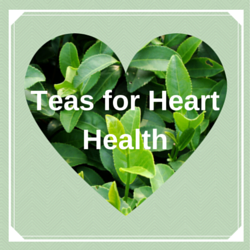The Right Tea Newsletter
–
Issue #33 - February 2021
Welcome to the latest issue of The Right Tea Newsletter!
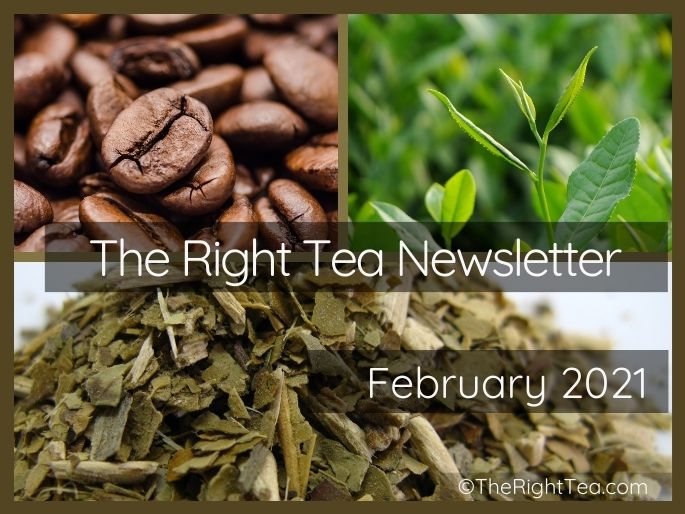
It is common knowledge that tea contains varying amounts of caffeine, even if it is less known what teas contain more or less caffeine and what factors play into it.
However, when it comes to other herbal infusions that don’t include the tea plant camellia sinensis, it is wrongly believed that none of these contain caffeine.
Sure, the exceptions are few, but they still do exist and you should be aware of them particularly if you are sensitive to caffeine or have been told not to ingest caffeine in any form.
Let’s begin!
Caffeinated Herbal Teas
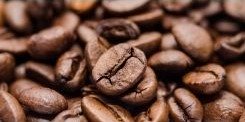
Either way, it’s good to know what foods and drinks contain caffeine as some may find their way into the ingredient list of your favorite blends and snacks.
Let’s begin with the most popular plants that contain caffeine. These are:
- coffee grains – the world’s favorite go-to beverage for a caffeine-fix;
- tea leaves (camellia sinensis) – depending on cultivation conditions and processing methods, tea may contain small amounts of caffeine that barely affect your nerves, or such high amounts to rival your cup of coffee;
- cacao pods – the source of yummy chocolate, the darker the chocolate, the higher the caffeine content (note: white chocolate has no cacao solids so it contains zero caffeine, it is actually made from cacao butter);
- cola nuts – part of the original recipe of Coca Cola, but today synthetic compounds or extracts are used to produce the flavor and add caffeine to your soda can.
What about herbal teas?
While most people are aware of the presence of caffeine on some level in the plants mentioned above, the majority also tend to believe that all other botanicals used for what we call “herbal teas”, “herbal infusions” or “tisanes” are caffeine-free.
However, there are a few exceptions and where some are not commonly used in the beverage industry world-wide, others are and if you are caffeine-sensitive it is important to become familiar with them.
Yerba Mate
(Ilex paraguariensis)
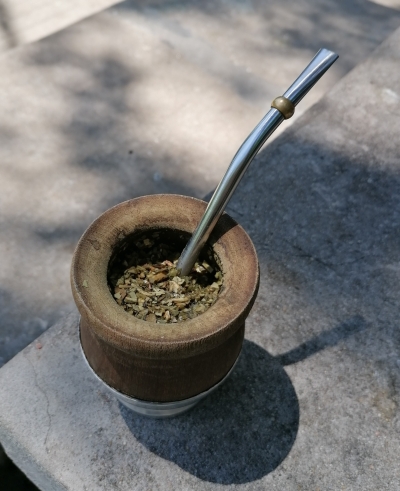
It is said to provide energy due to the caffeine present in the leaves and is often used to boost mental function.
You may also find it in digestive or detox blends that help stimulate the digestive tract. And these are just a few of the benefits commonly associated with yerba mate.
You may enjoy this tea using a teapot, infuser and mug, just like any other tea, but there is also a traditional South American way of drinking yerba mate by making use of a gourd and a bombilla.
With a smoky and earthy flavor, yerba mate blends well other herbs to create balancing infusions. Find out all about this tea here.
Guarana
(Paulinia cupana)
Native to the Amazonian region of Brazil, the guarana is a creeping bush that produces small round red fruits containing seeds used to produce caffeinated beverages.
The seeds are powdered and used to make a popular Brazilian caffeinated soft drink, aptly labeled “Guaraná”, and is also the ingredient to other energy drinks.
Roasted and ground the same seeds may be infused to create an infusion with an astringent and bitter flavor.
As with any caffeinated beverage, care should be taken not to ingest too much of it as it may increase heart rate, anxiety and nervousness.
Guayusa
(Ilex guayusa)
This plant today may be found growing in the part of the Amazon rainforest region of Ecuador. Its leaves are harvested and made into a tea that is smooth and floral, and less bitter than yerba mate or green tea.
The presence of caffeine in this plant has led to the natives of the region, the Kichwa, calling guayusa the “Night Watchman”. They would drink this infusion at social gatherings at dawn and exchange stories, dreams and knowledge.
When it comes to flavor, this herbal infusion is said to be like a less bitter version of yerba mate, just slightly sweet and with the smoothness of a green tea.
Yaupon
(Ilex vomitoria)
This is a holly plant that is native to the southeastern region of the United States, Bermuda, and Veracruz and Chiapas in Mexico. Native Americans used the leaves and stems in rituals.
European settlers learnt from the natives to drink this tea and Spanish colonists called it “té del indio” (Indian’s tea) and there are records from the 17th century that show that both colonists and natives enjoyed this beverage due to its caffeine content. It was even used as a substitute for coffee and tea during wartime.
Yaupon tea is made from the dried leaves and stems from the evergreen bush. There are roasted and non-roasted varieties: the roasted infusion resembles the flavor of yerba mate, whereas the non-roasted is said to be more like green tea.
Caffeine-free energetic teas
If you are sensitive to caffeine, you may experience difficulty sleeping at night and nervous anxiety throughout the day. You may with to try other herbal teas.
Some herbal teas may help provide energy by promoting blood flow throughout the body. You may want to consider: cinnamon; ginger; ginseng; and thyme.
Take a look at other herbal teas that promote a healthy heart and good blood pressure here:
However, when looking at energetic herbal teas, make sure to do research on the ingredients. For example, did you know that licorice tea is stimulating, but at the same time it may be harmful if you have high blood pressure.
In conclusion
With so many options available on the market when it comes to herbal infusions, it is important to read what are the herbs that make up each blend.
If the caffeine-containing herbs only make up a small proportion of the overall blend, then you may not even feel greatly the effects of the caffeine. And these herbs help to provide many more benefits than just an energy boost.
So, just remember to remain vigilant if you need to keep your caffeine intake down and keep informed when choosing your next herbal blend.
Remember to keep hydrated and stay healthy!
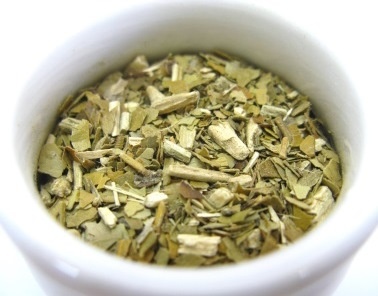
What’s Next?
More articles about tea are coming, so keep on the lookout for the next issue of our newsletter. While you wait, look around our website and learn more about tea and its health benefits.
Until then make sure to follow us on Facebook for daily tips and other wonderful tea related items.
Follow us also on Pinterest!
Comments / Suggestions
If you have any comments or suggestions regarding this newsletter or anything you would like to see on the website, make sure to contact us using the form you will find here:
Search Website:
Be healthy
with a wide
choice of herbs!

Prepare your tea!
Try these
Tea Samplers!

Wellness Pack at ArtofTea.com

Award Winning Pack ar ArtofTea.com
Find other
tea time items at ...


